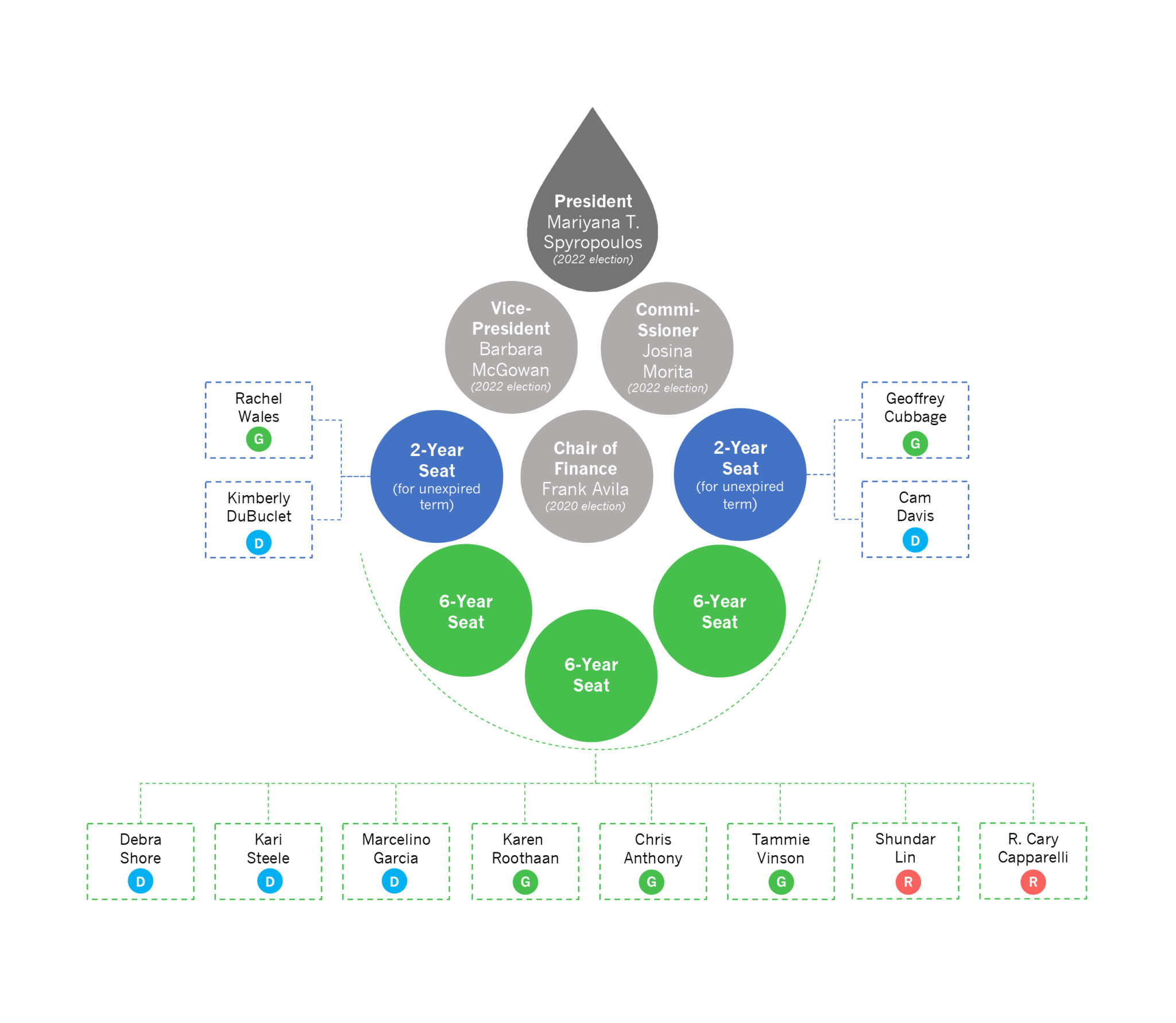It’s an unusual election year for the Metropolitan Water Reclamation District of Greater Chicago (MWRD). Normally, every two years, three of the nine seats on the district’s board of commissioners go up for election. Each seat has a six-year term. The idea is to stagger board turnover, so that from election year to election year, two-thirds of the board remains consistent.
But this year, there are five seats up for election. That’s more than half the board. Three of the seats are regular six-year terms. The two additional seats listed on this year’s ballot are two-year terms to fill two vacancies left on the board: one created by the departure of Cynthia Santos, who was appointed to the Illinois Pollution Control Board by Governor Bruce Rauner in 2016, and the other by the passing of commissioner Timothy Bradford in 2017.
With a 1.2 billion dollar annual budget and 2,000 full-time employees, the Metropolitan Water Reclamation District is one of the largest governmental entities in the county. It is technically not a city agency but a special-purpose district chartered by the state government. This is why Rauner has the power to appoint interim commissioners to vacant seats in between elections. This year, he appointed two political allies to fill those vacancies: Ken Dunkin, a former Democratic state representative who broke ranks to support Rauner, and David Walsh, whom he previously tapped to fill the vacancy left by Patrick Daley Thompson when he left upon being elected 11th Ward alderman. (Although Rauner has insisted that Walsh would stay in the seat through the end of Bradford’s term in 2020, a judge ruled last week that this seat would be up for election, too.)
The MWRD’s job? In short, to keep our drinking water source (Lake Michigan) clean and safe. For the MWRD, that means treating and disinfecting the city’s sewage—and keeping raw sewage out of the waterways. (Though hundreds of millions of gallons of sewage still ends up in the river during most heavy rainfalls.) To that end, the MWRD maintains a huge system of intercepting sewage lines, pumping stations, wastewater treatment plants, and boats designed to monitor levels of chemicals and bacteria in our waterways.
The MWRD’s board of commissioners has never been a paragon of virtue. Throughout the decades it’s been accused of being one of the more corrupt taxpayer-based bodies in the city. In the last decade, the district has strived to distance itself from that reputation, putting forth a vision for green infrastructure and sustainable operations. But recent controversies have put the board of commissioners back in the spotlight, and called into question their dedication to accountability and transparency at the district.
Here are some of the major issues the MWRD has confronted in the last year:
August 2018: The roof collapse in part of the Calumet Water Reclamation Plant in Riverdale, which injured ten workers. Two of these workers are now suing the district for negligence. The district has not yet updated the public with any findings from its investigation, which along with other probes by the federal Occupational Safety and Health Administration and state Department of Labor, is ongoing, according to Engineering News-Record magazine.
May-July 2018: The internal investigation and forced resignation of former executive director David St. Pierre, who eventually left with a $95,000 payout and a non-disparagement agreement—meaning that the public still does not know why he was asked to leave
February 2018: The Illinois Green Party’s analysis of donations to commissioner campaigns revealed pay-to-play politics at the district. In the past five years, a group of companies who together donated $400,000 to commissioners’ campaign funds have also received $722 million in contracts with the district, the analysis found. Among the biggest winners? Incumbent Democrat Debra Shore, who pulled in over $90,000 in the last five years. Martin Durkan and Kari Steele weighed in at $11,700 and $9,300 respectively. There are currently no limitations for campaign donations from companies seeking contracts at the district.
Will there be an Inspector General office at the MWRD? Last year the board of commissioners expressed interest in creating an IG office for the MWRD, one of the largest units of government in the state without one. An IG office would help to curb corruption and wasted taxpayer money. It looks like the board is moving forward with board president Spyropoulos’ blessing; she has added a line in the 2018 budget for the office. Still, Spyropoulos insists there is no pay-to-play politics at the MWRD despite having received over $60,000 from contract-holding companies in the last five years.
Because only two incumbent commissioners (Democrats Debra Shore and Kari Steele) are running for reelection (incumbent Martin Durkan lost the primary race earlier this year), this election is guaranteed to bring at least three new faces to the board. This means that Cook County taxpayers could see some changes—maybe not systemic change, but perhaps a shakeup of conversations and priorities at the district.
Here’s who’s running:

For the full terms, this includes both incumbent commissioners, Shore and Steele, and third Democrat Marcelino Garcia, a lawyer with the Cook County Health and Hospital System who has listed accountability and green infrastructure among his priorities. For the two-year terms, they have both endorsed Cam Davis, an environmental attorney and policy expert who served as the “Great Lakes Czar” under the Obama administration, and Kimberly DuBuclet, a former state representative and current director of legislative and community affairs for the Chicago Park District. For what it’s worth, the editorial boards of the Tribune and the Sun-Times have endorsed a full Democratic party line vote for all five seats.
But the Democratic candidates’ stronger governmental backgrounds—which is often the reason editorial boards justify endorsing certain candidates—shouldn’t discount the other candidates running for a seat.
The Illinois Green Party is running five candidates on a unified platform of promoting transparency, environmentalism, and good government at the district. For the six-year seats, the Green Party is running two veteran candidates, Karen Roothaan and Christopher Anthony, both of whom also ran in the 2016 elections, and Tammie Vinson. (Roothaan lost to now-commissioners Josina Morita, Barbara McGowan, and Mariyana Spyropoulos, but won ten percent of the vote: a substantial percentage for a third party candidate.)
Though running on a unified platform, each candidate has specific focuses. Southeast Side resident Roothaan is a lecturer in mathematics at nearby Purdue University Northwest, with experience organizing around community gardening and urban forestry. Her platform emphasizes the need for more innovative stormwater management systems. Pilsen resident Anthony is a former 25th Ward Green Party committeeman who emphasizes a better-managed budget, reevaluation of the MWRD’s properties, and the necessity of an IG office. Austin resident Vinson is a CPS special education teacher who wants to implement regular testing of biosolids and other byproducts of the MWRD’s sewage treatment process, and to rethink the number of tasks that MWRD outsources to private companies.
The Republican candidates for the six-year terms are Shundar Lin, a water scientist with a doctorate in sanitary engineering whose priorities include improving wastewater technologies, keeping our water clean, and balancing the budget; and R. Cary Capparelli, a former member of the board of the Illinois International Port District, and a South Dakota State University online geography instructor. Capparelli ran as a Democrat in the 2016 MWRD elections.
There are green party candidates running against the Democrats for both two-year terms: Green Party candidate Geoffrey Cubbage, a freelance writer and analyst and the secretary of the Illinois Green Party, and Rachel Wales, an environmental educator, activist, and Worth Township Green Party Commiteewoman.
It would be nice to see other party candidates, particularly those that are committed to transparency and overhauling procurement processes, sitting on a long-time Democratic board that caters to private business interests. But even if all five seats are filled by Democratic candidates, there will still be three new faces on the board. We’re going to see some small shifts in the board’s priorities—how, exactly, and what that means for Cook County residents, remains in question.
Emeline Posner is a managing editor at the Weekly and a freelance writer.



Thank you for this informative article!
I struggle with knowing how to make these voting decisions each election and this is by far the most detailed and fairly reported article I’ve read for this particular section of our ballot. Thank you!
I agree with Kelly’s comment. This is incredibly helpful and informative — thank you!
I agree with Erica’s comment. This is incredibly helpful and informative — thank you!
Dear South Side Weekly Readers — A friend of mine just happened to send me this old article from October last fall when I was running for commissioner. It’s a coincidence because one of the things mentioned in the article was whether the MWRD board of commissioners would approve an independent inspector general.
This past Thursday, April 18, the board of commissioners voted to approve an I.G. After 130 years since its founding, with a $1.1 billion annual budget and some 2,000 talented staff, this vital agency will finally have professional staff to investigate the possibility of waste, fraud and abuse.
I was proud to be a “YES” vote for an inspector general. One of my campaign promises last fall was to support an I.G. if Cook County voters elected me and I’m proud to have followed through on that commitment. But I really credit Commissioner Debra Shore, who originated the idea and pushed it tirelessly for two years. I also credit my fellow commissioners who voted for the measure this past Thursday. Now the measure moves to the Cook County Board of Commissioners who also have to approve the measure.
So though we have more steps in the journey, this is a major step for Cook County taxpayers. Congratulations.
Cameron Davis
MWRD Commissioner